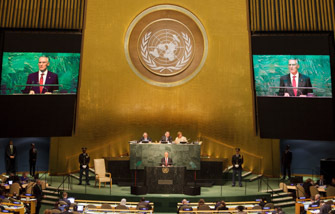
I am very pleased, once again, to attend the Communications Conference, organized by the Portuguese Communications Association.
This meeting is indeed a privileged opportunity to discuss the role of information and communications technology in economic activity, in the organization of society and in citizens’ lives.
Comprising a large number of players, arising from key sectors of the economy, such as transport, public administration, distribution and land planning, this Conference will surely be the right field to identify the challenges of the future and to search for the solutions to face them.
The dissemination of high speed electronic communications networks has impelled the development of digital economy, an essential factor for innovation and competitiveness, economic growth and promotion of qualified employment.
Digital economy swiftly spreads over all the sectors, without exception. The greatest impact of the digital networks occurs in the modernization of the existing activities. It is estimated that 75% of the impact of the Internet occurs in the sectors known as “traditional” and that the productivity of an SME may grow by 10% due to the use of digital technologies. Information and communication technologies should be able, by 2020, to add at least 4% to European gross product.
On the other hand this is a sector which has a strong growth factor in specialized employment, increasing by 4% per annum since 2000, sevenfold more than the average growth of employment in the same period.
In spite of this very positive development, the growth potential of employment in the sector runs the risk of underutilization. In effect, it is estimated that in the next few years, an employment gap of approximately one million professionals will happen in Europe. This is an opportunity that the Portuguese higher education institutions should consider with great care.
It should equally be stressed that European consumers are more than ever regular users of the Internet, even amongst the less favoured groups of citizens. Regular use of the net increased by 11 percent in only 4 years, it being estimated that it will reach 75% of the European population already next year. Portugal is one of the countries where greater progress in this field has been recorded, which indicates that the Internet, in the near future, will be part of the daily life of a large majority of our fellow citizens.
Trade and rendering of services through digital channels will additionally open a clear opportunity for gains in competitiveness and are relevant features for the purpose of internationalization, especially for SMEs which, by such means, will find greater ease for the expansion of their activities in foreign markets.
Abreast of this potential, digital channels will place new challenges, and thus cannot be ignored either by Portuguese enterprises or by the decision takers of the programmes for the strengthening of competitiveness within the scope of Portugal 2020.
Our country is exceedingly well placed to exploit the opportunities offered by the digital economy, and the development of the sector of information technologies has greatly contributed towards this.
As a result of the heavy investment of the national operators, the new generation networks are already reaching 85% of Portuguese households, well above the average European levels.
In its turn, the coverage of the 4G mobile networks has also advanced very positively, with our country occupying a second place in Europe, immediately behind Sweden. The weight of accesses supported by new generation technologies covers more than half of the total wide band subscriptions, which is one of the highest values in Europe.
The existence of a reliable and highly performing infrastructure opens enormous future possibilities. But the barriers to its use must be combated, such as the lower perception of their usefulness, the lack of digital skills and their costs, barriers that especially affect the less favoured sectors of society.
It must be recalled that, in spite of the encouraging statistics I have quoted, our country still shows one of the highest rates in the non-utilization of the Internet – which is estimated at more than 35% of the population, that is, much greater than the European average -, as well as one of the highest levels of workers with no digital skills.
Such weaknesses will have to be reduced or even expunged. The existence of a «digital gap» between regular Internet users and the so called «info-excluded» is, precisely, a component of inequality that opens up a social, economic and cultural cleavage which we cannot allow in a fair and developed country.
It is important to stress, however, that in the last decade strong progress was recorded in the modernization of our public services, as a result of investment in ICTs. This is shown by visible benefits occurring in the quality and availability of services and in the significant reduction in the respective costs,
Ladies and Gentlemen,
We are crossing an unprecedented period of changes in the sector of information technologies, which will cause deep impacts in operators and investors, as well as in workers and consumers.
We must not expect easiness, but we can face the future of digital economy, amongst us, with optimism and hope.
I am fully confident in the companies and in the capabilities of their managers and technicians to sustain the innovatory cycles and to reinvent business models, thus strengthening the sector, increasing its competitiveness and improving its preparedness to support the Country’s economic and social development.
I am certain that this Conference will, once again, provide concrete answers to the needs and challenges of the sector of information technologies.
I now wish you all fruitful work and the best results for this Conference.
Thank you very much.
© 2006-2016 Presidency of the Portuguese Republic
You have gained access to the records of the Official Site of the Presidency of the Republic from 9 March 2006 to 9 March 2016.
The contents available here were entered in the site during the 10 year period covering the two mandates of President of the Republic Aníbal Cavaco Silva.